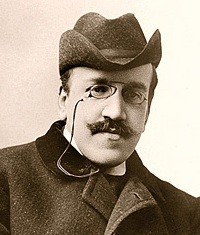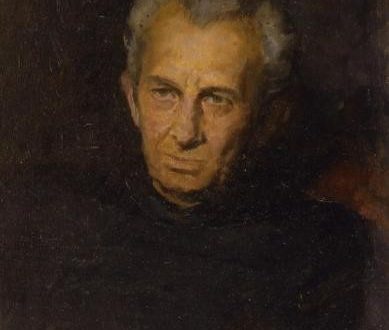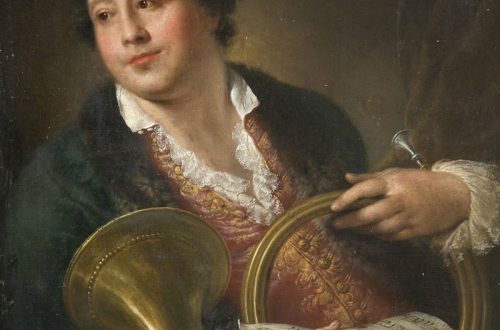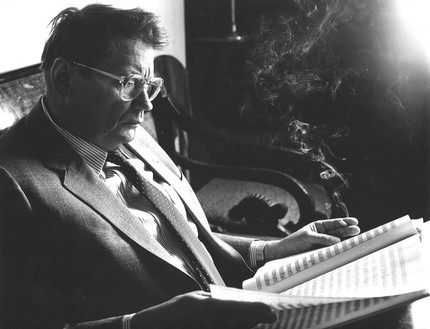
Vladimir Ivanovich Rebikov |
Contents
Vladimir Rebikov
All my life I’ve been dreaming new forms of art. A. Bely

In the 1910s on the streets of Yalta one could meet a tall, peculiar appearance of a man who always walked with two umbrellas – white from the sun and black from the rain. That was the composer and pianist V. Rebikov. Having lived a short life, but full of bright events and meetings, he was now looking for solitude and peace. An artist of innovative aspirations, a seeker of “new shores”, a composer who in many ways was ahead of his contemporaries in the use of individual expressive means, which later became the basis of the music of the XNUMXth century. in the work of A. Scriabin, I. Stravinsky, S. Prokofiev, K. Debussy – Rebikov suffered the tragic fate of a musician unrecognized in his homeland.
Rebikov was born into a family close to art (his mother and sisters were pianists). He graduated from Moscow University (Faculty of Philology). He studied music under the guidance of N. Klenovsky (a student of P. Tchaikovsky), and then devoted 3 years of hard work to studying the foundations of musical art in Berlin and Vienna under the guidance of well-known teachers – K. Meyerberger (music theory), O. Yasha (instrumentation), T. Muller (piano).
Already in those years, Rebikov’s interest in the idea of the mutual influence of music and words, music and painting was born. He studies the poetry of Russian symbolists, especially V. Bryusov, and the painting of foreign artists of the same direction – A. Böcklin, F. Stuck, M. Klninger. In 1893-1901. Rebikov taught at musical educational institutions in Moscow, Kyiv, Odessa, Chisinau, showing himself everywhere as a bright educator. He was the initiator of the creation of the Society of Russian Composers (1897-1900) – the first Russian composers’ organization. For the first decade of the XNUMXth century the peak of the highest take-off of Rebikov’s composing and artistic activity falls. He gives many and successful concerts abroad – in Berlin and Vienna, Prague and Leipzig, Florence and Paris, achieves the recognition of such prominent foreign musical figures as C. Debussy, M. Calvocoressi, B. Kalensky, O. Nedbal, Z. Neyedly, I. Pizzetti and others.
On the Russian and foreign stages, the best work of Rebikov, the opera “Yelka”, is successfully staged. Newspapers and magazines write and discuss about him. The short-lived fame of Rebikov faded away in those years when the talent of Scriabin and the young Prokofiev was powerfully revealed. But even then Rebikov was not completely forgotten, as evidenced by V. Nemirovich-Danchenko’s interest in his latest opera, The Nest of Nobles (based on the novel by I. Turgenev).
The style of Rebikov’s compositions (10 operas, 2 ballets, many piano program cycles and pieces, romances, music for children) is full of sharp contrasts. It mixes the traditions of sincere and unpretentious Russian everyday lyrics (it was not for nothing that P. Tchaikovsky responded very favorably to Rebikov’s creative debut, who found in the young composer’s music “considerable talent … poetry, beautiful harmonies and very remarkable musical ingenuity”) and bold innovative daring. This is clearly seen when comparing Rebikov’s first, still simple compositions (piano cycle “Autumn Memories” dedicated to Tchaikovsky, music for children, the opera “Yolka”, etc.) with his subsequent works (“Sketches of Moods, Sound Poems, White Songs” for piano, the opera Tea and The Abyss, etc.), in which the expressive means characteristic of the new artistic movements of the 50th century, such as symbolism, impressionism, expressionism, come to the fore. These works are also new in the forms created by Rebikov: “melomimics, meloplastics, rhythmic recitations, musical-psychographic dramas.” Rebikov’s creative heritage also includes a number of talentedly written articles on musical aesthetics: “Musical recordings of feelings, Music in XNUMX years, Orpheus and the Bacchantes”, etc. Rebikov knew how to “be original and at the same time simple and accessible, and this is his main merit to Russian music.
ABOUT. Tompakova
Compositions:
operas (music-psychological and psychographic dramas) – In a thunderstorm (based on the story “The Forest is Noisy” Korolenko, op. 5, 1893, post. 1894, City transport, Odessa), Princess Mary (based on the story “The Hero of Our time “Lermontov, not finished.), Christmas tree (based on the fairy tale “The Girl with Matches” by Andersen and the story “The Boy at Christ on the Christmas Tree” by Dostoevsky, op. 21, 1900, post. 1903, ME Medvedev’s enterprise, tr “Aquarium” , Moscow; 1905, Kharkov), Tea (based on the text of the poem of the same name by A. Vorotnikov, op. 34, 1904), Abyss (lib. R., based on the story of the same name by L. N. Andreev, op. 40, 1907), Woman with a Dagger (lib. R., based on the short story of the same name by A. Schnitzler, op. 41, 1910), Alpha and Omega (lib. R., op. 42, 1911), Narcissus (lib. R., based on Metamorphoses “Ovid in the translation of T. L. Shchepkina-Kupernik, op. 45, 1912), Arachne (lib. R., according to Ovid’s Metamorphoses, op. 49, 1915), Noble Nest (lib. R., according to one novel by I. S. Turgenev, op. 55, 1916), children’s extravaganza Prince Handsome and Princess Wonderful Charm (1900s); ballet – Snow White (based on the fairy tale “The Snow Queen” by Andersen); pieces for piano, choirs; romances, songs for children (to the words of Russian poets); arrangements of Czech and Slovak songs, etc.
Literary works: Orpheus and the Bacchantes, “RMG”, 1910, No 1; After 50 years, ibid., 1911, No. 1-3, 6-7, 13-14, 17-19, 22-25; Musical Recordings of Feeling, ibid., 1913, No 48.
References: Karatygin V. G., V. I. Rebikov, “In 7 days”, 1913, No 35; Stremin M., About Rebikov, “Artistic Life”, 1922, No 2; Berberov R., (foreword), in ed.: Rebikov V., Pieces for Piano, Notebook 1, M., 1968.





